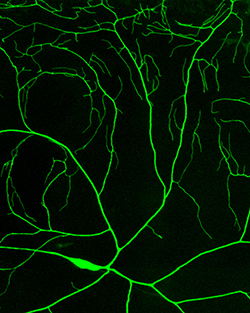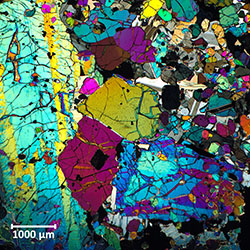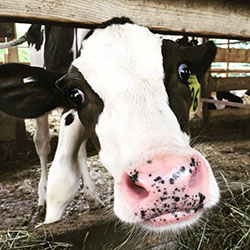
First place winner by Claire Kittock ’17 and Noor Anvery ’17
Veins of neon green trace a path across a stark black background in a photo taken by Claire Kittock ’17 and Noor Anvery ’17, displaying a web of microscopic neurons within the brain of a genetically altered fruit fly.
Kittock and Anvery captured the photo through a microscope while researching the cellular architecture of different animals with , assistant professor of . The photo later earned first place in the ’s first ever photo contest.
Kristi Mangine, °Ä˛ĘżŞ˝±â€™s science library coordinator, thought of the idea for the contest because she wanted to decorate the library’s bare walls and was inspired by several student workers whom she knew were passionate about photography.
“The student photographers have great perspectives on what’s going on around campus,” Mangine noted. “So I thought a photo contest would be great to highlight how [the students] see science at °Ä˛ĘżŞ˝±.”

Second place by Geology professor William Peck
In early February, Mangine and Peter Tagtmeyer, associate science librarian, e-mailed students, faculty, and members of the °Ä˛ĘżŞ˝± community asking for photos that represented their vision of “science at °Ä˛ĘżŞ˝±.”
After receiving 30 photo submissions, Mangine turned again to the community, this time for a vote to determine the six winners whose photos would be placed on permanent display in the library.
The winning photographs varied widely in subjects, techniques, and fields of study.
professor ’s jewel-toned photomicrograph of a moon rock took second place in the contest. The rock was collected by the Apollo 12 mission to Oceanus Procellarum in 1969. Peck receives a set of lunar samples from NASA every spring for use in his Geology 202 class, and this year’s sample, Lunar Basalt 12005, contained minerals that settled out of the moon’s lava lake approximately 3 billion years ago.

Third place by Leda Rosenthal ’18
In third place was a portrait of an inquisitive dairy cow snapped by Leda Rosenthal ’18. Rosenthal’s photo came from her time spent at the Durfee dairy farm in Chittenango, N.Y., where she worked as an agricultural economic fellow for °Ä˛ĘżŞ˝±â€™s Upstate Institute last summer.
Mangine noted that the contest had the added benefit of exposing little-known research projects on campus. “That’s the thing about °Ä˛ĘżŞ˝±,” she said. “There’s such amazing research going on behind closed doors. This contest lets you see it.”
